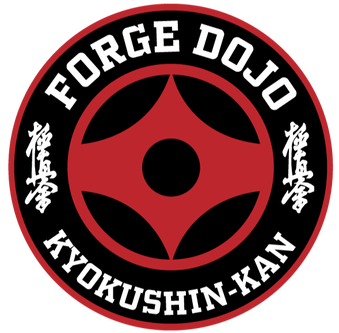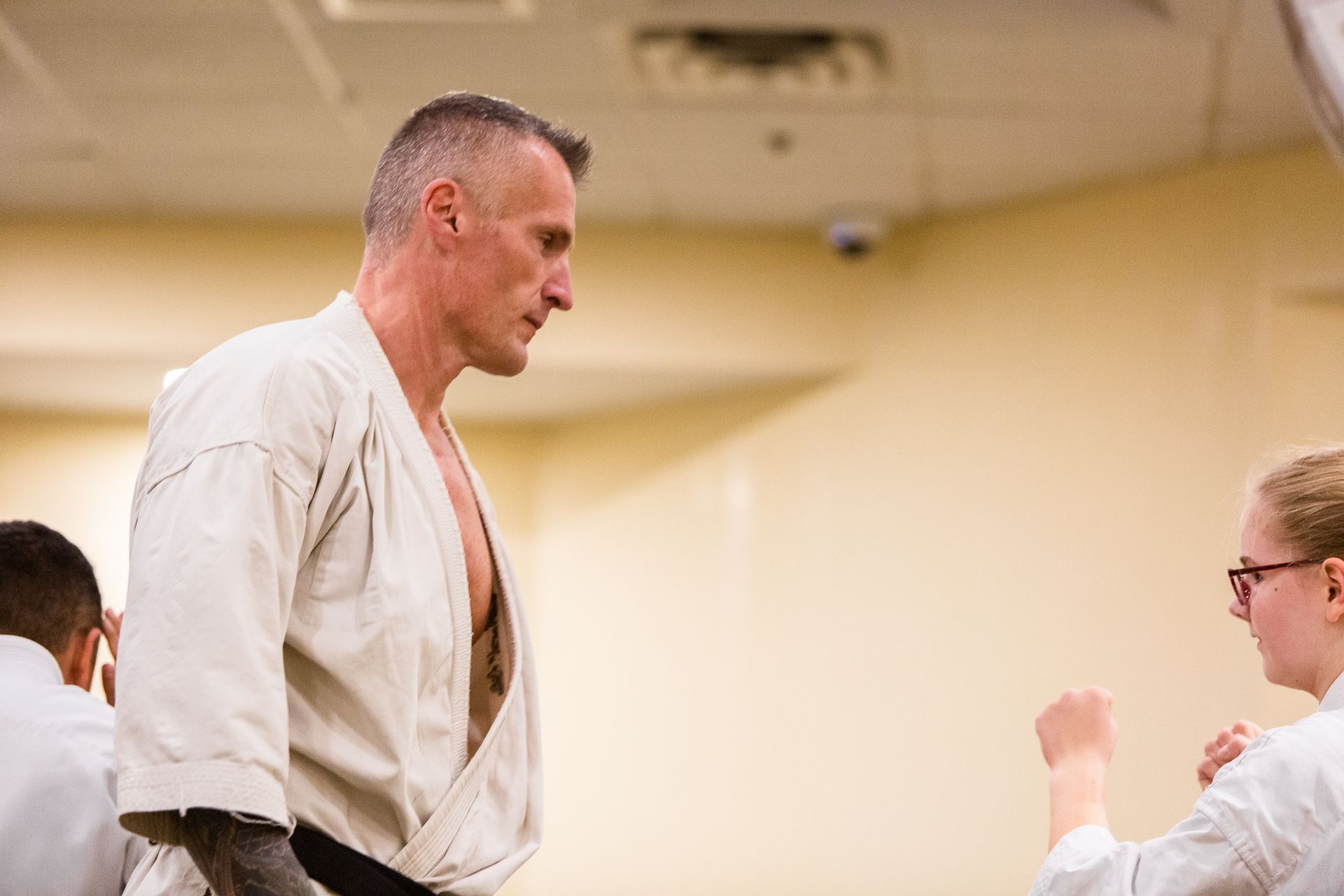
Odds are, if you’re asking the question in that way, you’re not too old. I mean, define “old.” What does it mean? What does it look like? How does it feel? And let’s say maybe you are old. Will NOT starting martial arts training make you better or worse off in another decade? Will putting something off (which it sounds like you REALLY want to try) fulfill you? More important than the number of trips around the sun you’ve successfully taken, let’s consider the battle going on in your mind. It has nothing to do with age. You’re just afraid…and that’s ok, because without fear, we don’t have opportunities to grow in courage. So what are you afraid of? Well, speaking from decades of experience, women are afraid of getting hurt, and men are afraid of being embarrassed. Let that simmer. Sound about right? Please, push back if it doesn’t. Let’s address both of those fears. First…yes, you could get hurt. But as I say regularly, you could hurt yourself picking up the laundry basket the wrong way. You could roll an ankle stepping over a toy in your kid’s room. Hell, you can get hurt sitting on the couch for too long! The truth is, we are never perfectly safe; there’s a certain degree of vigilance we need. Know where you can learn to be more vigilant and observant? That’s right…the dojo. The fear of being embarrassed, more likely fear of not being seen as the stud athlete you once were… Nobody cares what you were. They care about what you are. Are you living on the laurels of past success, or are you pursuing improvement? Guess what? The dojo can help with that too!
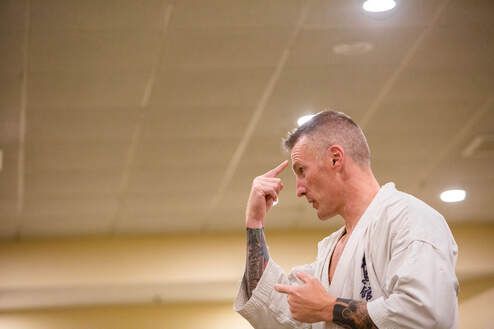
Happy Sunday! “I used to think of fighting as violent chess, but I’ve changed my mind. It’s definitely more like an…aggressive form of poker.” Sensei Bob I used to liken fighting and sparring to chess; as a game of strategy, with a significant planning and execution to the process. But, as most of you know…I’m always learning and reading and listening to my favorite podcasts. This week on The Drive , Peter Attia and his guest, Annie Duke, discussed decision making and she shared something that almost immediately shifting my thinking. Here’s my new thinking… Even with a basic understanding of the way the pieces move in chess, both players have access to all of the information available. Every possible move is available and visible to both players in the game. What you do with the given information is up to you. Poker on the other hand, specifically Texas Hold ‘Em, is a different monster altogether. You have sole access to your cards, shared access to the community cards, and no access to the cards of the other players. To me, this resembles our sparring more. You have all access to your cards, or skills. You know your strengths and can make some predictions on how the match should go according to your skill set. The problem is, especially in competition, you don’t have access to your opponents cards/skills. So where do the common community cards come into play? How in the world does that work in sparring, and competition. When you step into a match, what could you possibly have in common with your opponent? Well, in my current thinking, I’m focused on the practicals. We’ve got the agreed upon rules, and the time limits of the rounds/match. Those confines of the match are available to both competitors to use as they wish. So, how do you get to be good at using those cards? How do you grow in your ability to use the community cards to predict what cards your opponent might be holding? The answer to that is actually very simple: PRACTICE . So, this week, we will be doing a lot of practicing rounds; with different time limits and different rule sets. Our goal is to get enough practice over the next few months that we can turn off our thinking brain and turn using our personal skills (cards) with as little thought as possible.
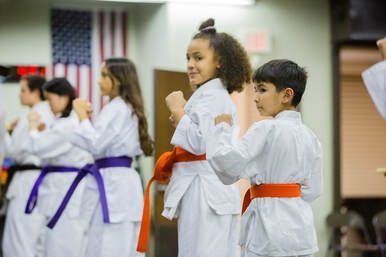
I get this question a lot; mostly from parents looking to give their sons and daughters a boost in confidence. I think it’s that way because we’ve all seen advertisements from McDojos claiming that martial arts helps with discipline and confidence. And, while there’s truth to it, personal growth doesn’t play out in the way that many expect. There are no explicit lessons on self-confidence. There are no speeches or words of encouragement that are specifically geared to kick a student’s confidence up a notch or two. I don’t use patches or stripes or stickers to help students grow in this area either. By the way, at this point, I’m referring to ALL of the students who train at Forge Dojo. There aren’t “attaboys/attagirls”. There’s no puffed-up encouragement. What there is…and a whole bunch of…is honesty. Our Juniors Class (our youngest students) knows this by now when I ask them “Do you want me to be nice, or do you want me to be honest?” Even at 5 years old, they are learning that an honest word, given the right way, can feed you for a long, long time while false encouragement loses its appeal rather quickly. Regularly in the dojo, you’ll hear me say something along the lines of: “I will not say nice things to make you feel good about yourself. I will tell you the truth, always, and if that truth encourages you…then you’re winning the game.” False encouragement, like a participation trophy or 50th Place ribbon, doesn’t help in the long run. Genuine encouragement and instruction, while sometimes a little harder to handle, make weak people strong and strong people unstoppable. There’s also the physical part of our training. Have you ever done a burpee? Have you ever tried to see how many you can do in 7 minutes? Everyone in our Teen/Parents Class can tell you how it feels because we do that monthly. I recently read a quote from David Goggins that went: “There is great beauty when you are involved in something so hard that most people want it to end.” In our style, we all experience that beauty regularly…daily even. Do you know how that BOOSTS self-confidence? Try it… So yeah, Kyokushin karate training, particularly in our dojo, improves confidence. Just maybe not in the way you think.
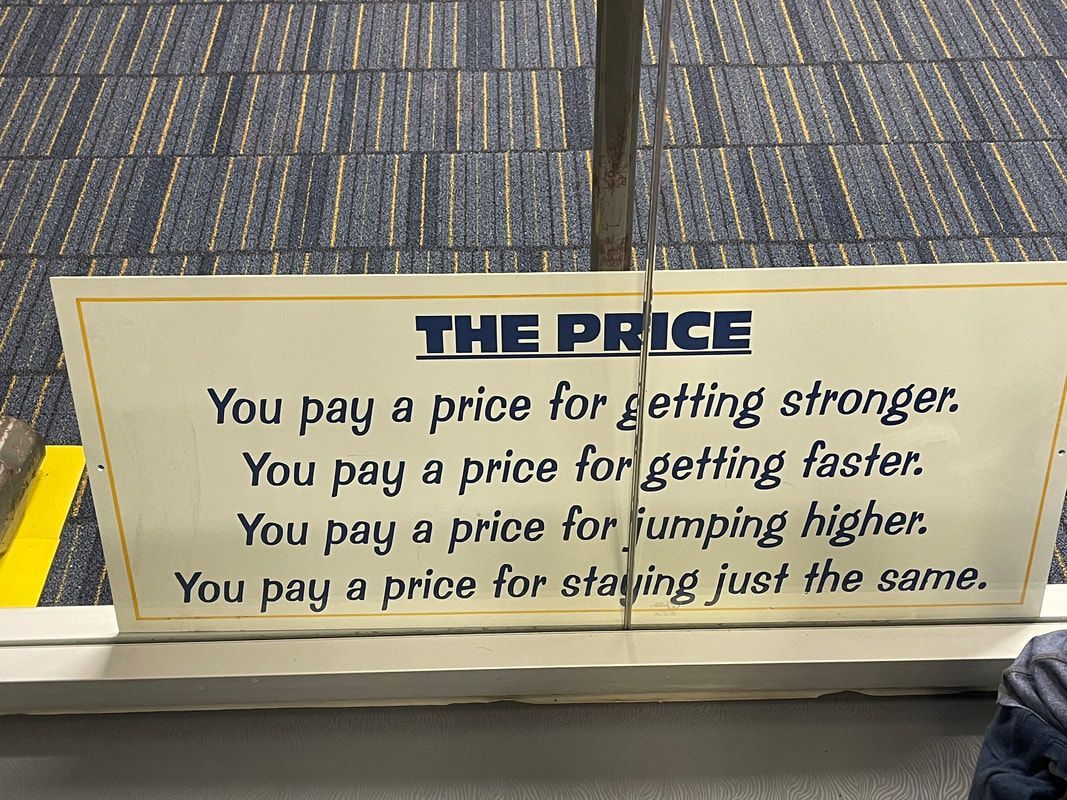
I saw that quote in the WVU Football training center this weekend. I’ve been in that space a dozen times over the past year, but have never noticed it before. The head trainer there, Mike Joseph, is one of my go-to guys for strength and athletic development. That quote prompted a great conversation on the drive home earlier this morning. Everything comes with a price. For me, training in the dojo has a price of time and a lot of physical and mental effort. To keep up with my strength regimen, more time is sacrificed. All of the reading I like to do and podcasts that I like to listen to come at the sacrifice of more and more time. And when I think about it like that, specifically with the word sacrifice, it seems like I’m giving something up. Instead, I’ve changed my vocabulary; and encourage you to do the same. I’m not sacrificing time. I’m not giving anything up, at all! I’m investing my time. When you (or your future black belt) train in the dojo, you’re investing time into: - Developing a strong body - Enhancing your mental well being - Increasing your opportunities to socialize with a strong community of diverse people - Improving your balance and flexibility. Crucial as we get older! - Reducing your stress levels (unless you’re testing for black belt!) - Increasing focus and concentration - Improving your attention to detail The fact of the matter is that I’m not sacrificing a blessed thing…and the return on the investment of time is usually immediate!
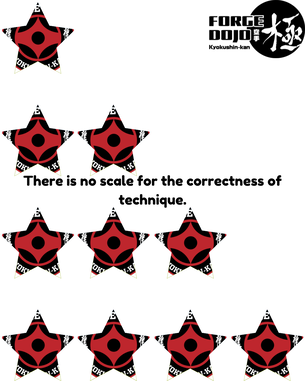
Last night in the dojo, while working on kata and correcting a couple of points, I asked the question; "On a scale of 1-10, what would you rate this (my) stance?" The answers ranged from 2-9...nobody dared to call it perfect or pathetic, which is normal. We often assess quality on a scale. As a biology teacher, I am constantly assessing performance and mastery on a scale. At the doctor's office, you're assessed on a scale, and not just the one that measures your weight. With our training in the dojo, something that I am challenging our group with is to change the way that we think about assessing technique and application of technique in kata. Rather than seeing a stance and telling your partner "it's ok" or "I'd give it 3 out of four stars", my hope is that we can objectively assess correctness. Rather than using a scale of 1-10, or a 4-star ranking; I am pushing to have a 1 OR 10, or a 1 OR 4-star ranking. Technique is either correct or incorrect. The many shades of "close" or "almost" that are in between...aren't really in between at all; they are all shades of incorrect! I think that many of us have been conditioned to feel that correcting someone is somehow unkind or unloving. To the contrary, I would say that NOT correcting someone is one of the most unkind and unloving things one can do! To see someone fall short and NOT help them understand what needs to be corrected might make that person feel better in the moment, but one day reality will reveal the truth. It's better to receive correction from a friend, teacher, teammate, or training partner than from anyone else! This transition in our thinking is going to take a lot of work and practice. We have to become comfortable with giving and receiving objective feedback. I'm excited to see how this shift in our dojo community plays out over the next couple of weeks and months. My hope is that the quality of our training will continue to soar!
"You don't raise heroes, you raise sons. And if you raise them like sons, they'll turn out to be heroes, even if it is just in your eyes." -Walter M. Schirra, Sr. If you have sons of your own or work in a field like me where you have opportunities to mentor young men, then I cannot recommend the linked episode of the Rich Roll Podcast more highly. In this episode they touch on: - challenges faced by young men - lack of empathy for young men - impact of technology on young men - impact of education and support - the decline of mentorship and community programs - masculinity and fitness - influence and service and a lot more. For a while now, I've felt a "pull" to do something more in this area. As a teacher, I can do some but am limited by administrative policies and procedures. As a martial arts instructor, I can do more, but have a limited time. The stars seem to be lining up for me to start making a concentrated effort at addressing some of the same topics brought up in the podcast here in our local communities. Wish me luck...
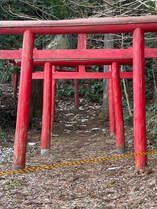
The more I process the trip, the more of an impact I realize small gestures had on me. As I look back at the Sayonara Party (a tradition after the final training session) the leadership in the room was quite active. The three most senior leaders of the Kyokushinkan organization went around the room and personally thanked each of us for coming and training and learning together. Each time, they made sure that we had enough sake to drink and here's where something happened that I think will have a long-term impact. I don't drink alcohol anymore. It'll be 3 years this July actually that I stopped. While this fact is usually met with either a "good for you" or a "what's wrong with you" response, the best response was none at all. In making his rounds, one of the senior leaders offered me some terrific (from what they say) local sake. I politely explained that I don't drink alcohol and this teacher spent the next few moments searching the room for a pitcher of water to fill my glass. No questions. No "Are you sure?" No pressure. There didn't need to be a conversation about my decision. It was one of the most pure expressions of kindness; and I don't think he realized how much it meant to me. The two things that stuck out from this experience were: 1. The LEADERS were serving. 2. The backstory wasn't as important as the current chapter. I've got one more story to share later this week:-) Be blessed!
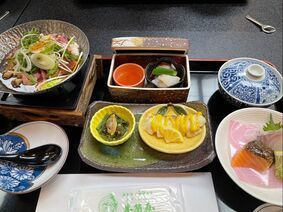
" It's the little details that are vital. Little things make big things happen. " ~ John Wooden A wise man recently shared with me his belief that budo karate training is nearly impossible to grasp outside of the Japanese culture. That thought has resonated with me since the trip and I see more connections daily. The more I reflect, the more intentionality I see in just about everything. From where on a tray a specific food is placed to public escalators being motion activated, there are countless examples of attention to detail, and a sense of purpose, in daily life. The Japanese instructors that we trained with are absolutely amazing. Their technique and execution are jaw-dropping. At one point in the training, we had a seminar on scoring kata/forms for competition. In my group, this looked like me performing a kata and then the other instructors pointing out things that were wrong...and boy were there some errors! It was humbling in a way, and I'm incredibly grateful for their feedback. So thankful, that I took notes on their suggestions. It wasn't long before I noticed a theme. See, this particular kata, I've competed with...and won before. I know the kata, but there were details that were pointed out to me that I do need to do better. In all, there were 7 details that I lost points for in my performance and 6 of them (I would bet) would not have been noticed outside of Japan. The attention to those small details, and the training of those details are one of the reasons (I believe) that the Japanese instructors and their students excel in kata. Everything has a purpose. As I was being corrected, and the purpose to the details was made clear to me, it seemed so natural to make the change. Sure, I've got to unlearn what I was doing and intentionally train to incorporate the adjustments needed, but I understand the reason for such specificity in the detail. I think we can get bogged down with the details sometimes. I know that my students can be tempted to become discouraged. This is why I try as best I can to explain the purpose. Regularly (just yesterday in fact) I will say "This isn't the standard because we want just one more detail to have to attend to. This isn't correct because we just want to have a millionth detail to worry about. This is the correct way because ______________. Knowing the "why" makes performing the "what" a lot easier. Thankfully, we've cultivated a culture in our dojo that encourages questions. I encourage asking "why" when students are struggling, even though there are times when I'll share that the "secret" or purpose behind a movement will be found in the training itself. More to come. Be blessed. Osu!

My knowledge of the Japanese language is in its infancy...maybe. I know enough to train in the dojo, and to follow basic directions, but that's pretty much it. Oh, I also know the different ways to say "thank you" and "you're welcome." Had I not know those last two before training In Japan, I would have picked them up quickly. In almost every single exchange with other people; both in the training seminar and out in the town/city, you're going to hear "thank you". Honestly, sincerely, I must have heard "thank you" a hundred times each day. No exaggeration. Several times I pondered the cause of the thanks given. What was It's source? Was it just a prescribed behavior that has been engineered into the culture? Was it just a formality? Did they actually mean it or was this some superficial expression Iike when we ask someone "how's it going?" with no real care for an authentic response? Did it matter? I've been reading a lot on aetiology and teleology as explained by Adlerian psychology. Basically, do we look back at the cause of a behavior or, do we look at how current behavior will impact the future? This got me thinking. Did the consistent, regular expression of thanks change my behavior? Yes! When everyone around me was expressing gratitude, it put me in a mindset of wanting to look for things to be thankful for. Every small gift, every kind word, every bit of help, each encouragement...I was on the hunt to be thankful. It's really hard to complain when you're preoccupied with thankfulness. I hope I can do better at bringing this part of the Japanese culture back home and applying it. If you've made it this far...thank you:-) It means a lot to know that someone is finding value in my words, stories, and experiences. Be blessed!

This week a friend asked me to share the photo from Japan that had the most meaning to me. This one immediately came to mind. This path, with its torii (gates) led up a hill to a shine dedicated to cats. What struck me about this short hike was the way that, through certain angles, the torii appeared to be almost haphazardly placed. There was no rhyme or reason, other than that they marked the path. But standing on the path, It was clear. The torii were precisely placed; and this could only be noticed while on the path. We're all on a path. At times, it can feel like there's nothing but chaos, but stay on the path. One step at a time. One gate at a time. Keep fighting. Have faith.
Interested in learning more? Connect with us at (240) 899-3517!
